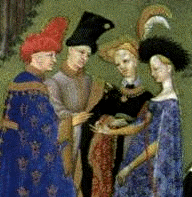DAUGHTERS OF EVE, SISTERS OF MARY: WOMEN IN THE MIDDLE AGES

SCHEDULE OF CLASSES AND READINGS

SCHEDULE OF CLASSES AND READINGS
August 19: Introduction to the Course: Women, Gender, and the Body
August 21: The Legacy of the Ancient World: Medical, Legal, and Religious
Secondary Source Reading:
Bitel, 1-30
Gendering the Master Narrative (abbrev. GMN): Mary Erler and
Maryanne Kowaleski, “A new economy of power relations:
female agency in the Middle Ages”
Reserve Room: Joyce Salisbury, “Gendered Sexuality,” in Handbook of
Medieval Sexuality, 81-102
Primary Source Readings:
Amt, 29-35
Online text: Aristotle and Galen on the Nature, Biology and Social Position
of Women
(http://www.uncg.edu/~rebarton/ancient-women.htm)
August 26: Christian Heritage: the Bible and St Paul
August 28: St. Augustine, St. Jerome, and Female Asceticism
Secondary Source Readings:
Bitel, 30-45
Primary Source Readings:
Amt, 13-28
Online texts: Biblical and Early Christian Authorities
(http://www.uncg.edu/~rebarton/biblical-women.htm)
September 2: Merovingian Society
DUE: Research Topics and Initial Questions (1 Paragraph)
September 4: Merovingian Queens
Secondary Source Reading:
Bitel, 45-94
GMN: Jo Ann McNamara, “Women and power through the family revisited”
Primary Source Readings:
Amt, 38-49, 121-129
Online text: Gregory of Tours on Frankish Queens (http://www.uncg.edu/~rebarton/frankish-queens.htm)
September 9: Sainted Women of the Dark Ages
September 11: Saint Radegund
DUE: Analytical Essay 1: Gender as a Tool of Analysis
Secondary Source Reading:
Bitel, 95-153
GMN: Jocelyn Wogan-Browne, “Powers of record, powers of example: hagiography
and
women's history”
Primary Source Readings:
Amt, 219-233
Reserve Room: Two Lives of St. Radegund, pp. 60-105 in Sainted Women
of the Dark Ages,
ed. Jo Ann McNamara
September 16: Carolingian Marriage and Family; the Case of Lothar and
Theutberga
September 18: Changes in Marriage patterns in 10th and 11th centuries
Secondary Source Reading
Bitel, 154-199
Reserve Room: Stuart Airlie, “Private Bodies and the Body Public: the Divorce
Case of Lothar
II,” Past and Present 161 (1998), 3-38. (also available electronically
through the library)
Optional Secondary Source: Reserve Room: Gies and Gies, 121-132
Primary Source Reading
Online text: The Case of Emperor Lothar vs. Empress Theutberga
(http://www.uncg.edu/~rebarton/theutberga.html)
Online texts: Church Reform: Clerical Marriage and Misogynist Propaganda
(http://www.uncg.edu/~rebarton/churchreform.htm)
September 23: Debate Preparation
September 25: Debate
September 30: Aristocratic Women
DUE: Analytical Essay 2: Argument Essay
October 2: Women and Chivalry: Eleanor of Aquitaine
Secondary Source Reading:
Bitel, 266-297
Optional: Reserve Room: Gies, 121-133
Primary Source Readings:
Amt, 53-60, 152-157
Online texts: Norman Noblewomen of the Eleventh Century
(http://www.uncg.edu/~rebarton/normanwomen.htm)
October 7: Women and Romance: Marie de France and Chretien de Troyes
October 9: “The Frailer Sex:” Hildegard of Bingen and Womanhood
Oct 10: Last Day to Drop without Penalty
Primary Source Readings:
Amt, 233-235 (letter of Hildegard)
Reserve Room: Marie de France, “Le Fresne”, pp. 73-91 in The Lais of
Marie de France,
trans. Robert Hanning and Joan Ferrante (1978)
October 14: FALL BREAK
October 18: Abelard and Heloise
Secondary Source:
Reserve Room: Catherine Brown, “Muliebriter: Doing Gender in the Letters
of Heloise,” in
Gender and Text in the Later Middle Ages, ed. Jane Chance (Gainesville:
University
Press of Florida, 1996), 25-51.
Primary Sources:
The Letters of Abelard and Heloise, pp. 57-106, 109-156, 159-179
The Lost love letters? (TBA if used at all)
October 21: Debate Prep
October 23: Debate
October 28: Gendered Definitions of Sexuality and Gender: the Rise of
Canon Law
DUE: Bibliography
DUE: Analytical Essay 3: Critique of a Secondary Source
October 30: Working Women, 1: Peasants
Secondary Source Reading:
Reserve Room: Christopher Brooke, “Marriage in Law and Practice,” in Brooke,
The
Medieval
Idea of Marriage (Oxford: Clarendon Press, 1989), 119-143.
Reserve Room: James Brundage, “Sex and Canon Law,” in Handbook of Medieval
Sexuality,
33-50.
GMN: Katherine French, “Women in the late medieval English parish”
Primary Source Reading:
Amt, Amt, 79-94 (marriage law), 136-141 (Markyate), 179-193 (agriculture
and peasants)
November 4: NO CLASS: Instructor at conference
November 6: Sexuality and Women
Secondary Source Readings:
Ruth Karras, Common Women: Prostitution and Sexuality in Medieval England,
intro, 1-83
November 11: Sexuality and Women, part 2
November 13: Working Women, 2: Townswomen
Secondary Source Readings:
Ruth Karras, Common Women: Prostitution and Sexuality in Medieval England,
83-end
Reserve Room: Martha Howell, “Citizenship and Gender: Women’s Political
Status in Northern
Medieval Cities,” in Women and Power, 37-60
Primary Source Reading:
Amt, 194-215 (towns)
November 18: Women and the Virgin: mother, sister, goddess?
November 20: Female Piety and Spirituality: Catherine of Siena
Secondary Source Reading:
GMN: Pamela Sheingorn, “‘The wise mother’: the image of St. Anne teaching
the Virgin Mary”
GMN: Wendy Larson: “Who is the master of this narrative? Maternal patronage
of the cult of St.
Margaret”
GMN: Barbara Newman, “Did goddesses empower women? the case of Dame Nature”
Reserve Room: Caroline Walker Bynum, “Fast, Feast and Flesh: the Religious
Significance of Food
to Medieval Women,” in Representations 11 (1985), 1-25.
Primary Source Readings:
Online texts: The Cult of the Virgin (http://www.uncg.edu/~rebarton/cultofvirgin.htm)
Online text: A Letter of Catherine of Siena (http://www.uncg.edu/~rebarton/cathsienaletter.htm)
November 25: Women and Literature: Christine of Pizan
DUE: First Draft of Research Paper
Primary Source Reading:
Reserve Room: Christine de Pisan, selections from her work (Willard, The
Writings, ix-xv, 137-
144, 151-161, 171-212)
November 27: Thanksgiving Break
December 2: Margery Kempe
December 4: Joan of Arc and the politics of gender
Secondary Sources:
GMN: Felicity Riddy, “Looking closely: authority and intimacy in the late
medieval urban home”
Reserve Room: Anthony Goodman, “The Piety of The Book of Margery Kempe,”
100-126 in
Goodman, Margery Kempe and Her World
Primary Sources:
On-line: The Life and Trial of Joan of Arc (http://www.uncg.edu/~rebarton/joanofarc.htm)
Monday December 8: Final Drafts of Research Papers Due in My Office by Noon